Sports
/ArcaMax
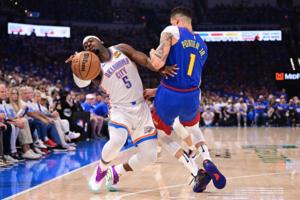
Nuggets allow another fourth-quarter lead to slip despite Nikola Jokic's epic night, fall behind 3-2 to Thunder
OKLAHOMA CITY — Deep in tornado alley, Lu Dort brought the Thunder to Denver’s season.
The Nuggets haven’t quite been struck by lightning yet, but they are on the brink of elimination after a 112-105 Game 5 loss Tuesday in Oklahoma City, where Dort’s 3-point barrage ignited a comeback by the top-seeded hosts. Denver led by as many as 12...Read more
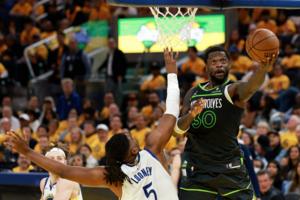
Finally a postseason force, Julius Randle credits Kobe Bryant for instilling 'Mamba Mentality'
Julius Randle had just scored 31 points, his career high in the playoffs.
He was a game removed from his first postseason triple-double.
After his team's Game 4 win over the Golden State Warriors on Tuesday night, Randle was asked about how he's been able to finally shake his reputation as a player who fades during the playoffs. Much of the ...Read more
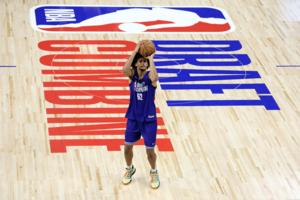
Who stood out on first day of the NBA draft combine? And who should the Bulls keep an eye on?
CHICAGO — With the draft order now set for the top 14 picks, the NBA turned its attention toward the court at Wintrust Arena on Tuesday to begin analyzing the measurements and skill sets of the 2025 prospects.
Cooper Flagg headlined yet another day of predraft festivities, but the first day of the combine also offered an opportunity for non-...Read more
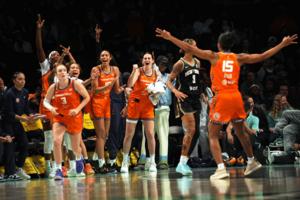
Dom Amore: Sun departure would be sad, but WNBA's growth may make it inevitable
UNCASVILLE, Conn. — This is that time of year for bitter sweetness. Graduation ceremonies and parties are everywhere, with their hugs, tears, excitement, pride and vows of forever friendship when, deep down, we know we are saying goodbye.
There may be a lot of that around the Mohegan Sun Arena this summer. The rapid, recent growth of the WNBA...Read more
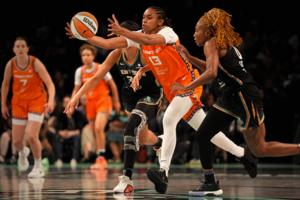
Connecticut Sun ownership exploring 'options' including sale amid demand for major investment
UNCASVILLE, Conn. — The Connecticut Sun spent much of the last year emphatically denying that Mohegan Tribe ownership group was considering selling the franchise, but that narrative changed dramatically on Monday when it was reported that the team’s owners hired investment bank Allen & Company to explore a sale.
Team president Jennifer ...Read more
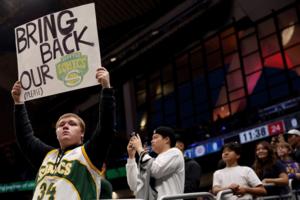
Sonics return could be closer as NBA expansion talks coming this summer
SEATTLE — NBA commissioner Adam Silver said Tuesday he expects discussion about expansion to be on the agenda for the next meeting of the league’s owners this summer.
Speaking on SiriusXM NBA Radio, Silver was asked how the view of expansion has progressed in the nearly eight weeks since the last meeting of the Board of Governors in New ...Read more

Steph Curry ruled out for Warriors' do-or-die Game 5
The Golden State Warriors have officially ruled out Steph Curry from Game 5 of their series with the Minnesota Timberwolves.
Golden State must stave off elimination without its two-time MVP superstar in a road environment after losing the last three games since he went down with a hamstring injury in Game 1.
The team’s injury report ...Read more
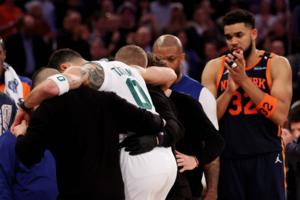
Celtics superstar Jayson Tatum undergoes season-ending surgery for ruptured Achilles
BOSTON — Jayson Tatum underwent surgery Tuesday to repair a ruptured right Achilles tendon, ending his season and putting his availability for the 2025-26 campaign in jeopardy.
“No timetable is currently available for his return,” the Celtics said in a statement confirming the diagnosis, “but he is expected to make a full recovery.”
...Read more
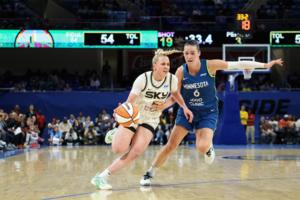
Hailey Van Lith made the Sky's 12-player roster. But why are there so few spots on WNBA teams?
CHICAGO — The Chicago Sky made their last three roster cuts Sunday, finalizing the 2025 roster less than a week ahead of the team’s season opener against the Indiana Fever.
No. 11 overall pick Hailey Van Lith and second-round pick Maddy Westbeld earned the final two openings after the Sky waived Jessika Carter, Morgan Bertsch and Ally ...Read more
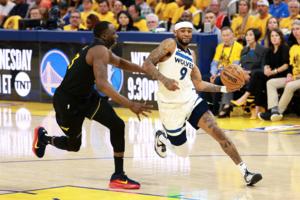
Timberwolves go up 3-1 after 117-110 win over Warriors in Game 4 of Western Conference semifinals
SAN FRANCISCO – Even though the Wolves had won Games 2 and 3, it rarely felt over those two games like they reached their peak potential in this series against the Stephen Curry-less Golden State Warriors.
They did that in the third quarter of Game 4 Monday, and that carried the Wolves to a 117-110 victory over the Warriors for a 3-1 series ...Read more
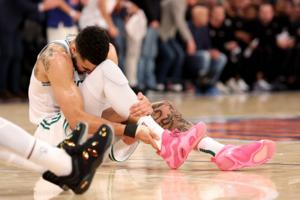
Celtics' Jayson Tatum suffers apparent leg injury in Game 4 loss vs. Knicks
NEW YORK — Jayson Tatum was leading his defending champion Boston Celtics squad to a late comeback in hopes to tie the series with the New York Knicks at 2-2.
Then Boston’s repeat title hopes went up in flames as the superstar suffered an apparent non-contact right leg injury with 3:07 remaining in the fourth quarter. The injury took place ...Read more
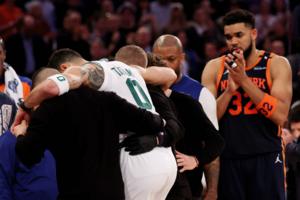
Jayson Tatum injured as Knicks win Game 4, push Celtics to brink
NEW YORK — The Boston Celtics bid for back-to-back NBA titles officially is on life support after yet another second-half nosedive.
Looking to even the Eastern Conference semifinals at two games apiece, Boston instead squandered a 14-point third-quarter lead and a standout performance from Jayson Tatum in a 121-113 loss to the New York Knicks...Read more
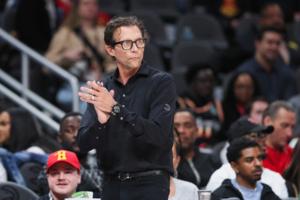
Hawks to pick 13th in next month's NBA draft
The results are in, and the Atlanta Hawks officially will make their pick in next month’s NBA draft at No. 13.
After choosing forward Zaccharie Risacher No. 1 overall in last year’s draft, the Hawks will have two first-round choices in 2025. They will also pick at No. 22.
The Dallas Mavericks won Monday night’s NBA draft lottery in ...Read more
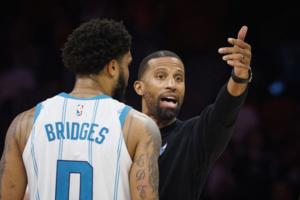
Hornets secure fourth pick in 2025 NBA draft after Mavericks win lottery
CHICAGO — Chalk up yet another disappointing night for the Charlotte Hornets.
Armed with the top odds — along with Utah and Washington — to land the No. 1 overall pick, the Hornets failed to win the 2025 NBA draft lottery on Monday night at McCormick Place, foiling the opportunity to secure a potentially franchise-altering player in Duke ...Read more
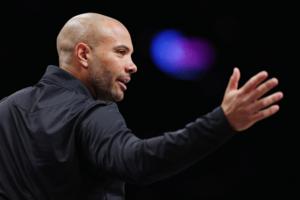
Nets land No. 8 overall pick in 2025 NBA draft
The Brooklyn Nets, represented by head coach Jordi Fernandez at the 41st annual NBA draft lottery in Chicago, secured the No. 8 overall pick in the 2025 NBA draft on Monday.
Brooklyn entered the night with the sixth-best odds, holding a 37.2% chance of picking in the Top 4 and a 9.0% chance of landing the No. 1 overall pick.
The Dallas ...Read more
Sixers land No. 3 pick in 2025 NBA draft, keeping top-six protected selection away from Thunder
Finally free of months of suspense, the 76ers can start to put things in motion.
They can also celebrate this thing over which they had no control, but that wound up meaning so much to them. They can grin and laugh and embrace now that the results of Monday’s NBA draft lottery are finalized.
The Sixers will select third in June‘s draft. ...Read more

Bulls stay put in NBA draft lottery and will have the No. 12 pick in the 1st round
CHICAGO — Luck was not in the Chicago Bulls’ favor Monday night.
The Bulls didn’t improve their positioning in the NBA draft lottery at McCormick Place and will have the No. 12 pick in the first round. The Dallas Mavericks won the No. 1 pick — despite the fourth-worst odds at 1.8% — and almost certainly will select Duke superstar ...Read more
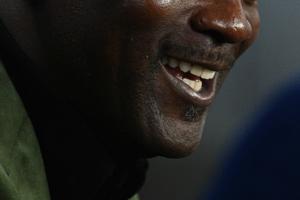
Michael Jordan to join NBC's team for NBA broadcasts during the 2025-26 season
CHICAGO — The G.O.A.T. is headed to the broadcast studio.
NBC Universal announced Monday that six-time NBA champion and Hall of Famer Michael Jordan will join the studio’s coverage of the NBA this fall.
The Chicago Bulls legend will be a “special contributor” to NBC broadcasts beginning in October. NBC made the announcement during an ...Read more
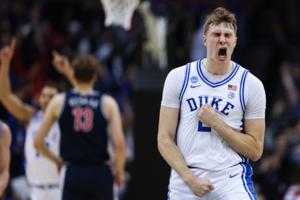
David Murphy: The real math says the Sixers won't land Cooper Flagg. But what about the conspiracy math?
PHILADELPHIA — Do I think the Sixers are going to end up drafting Cooper Flagg?
No, I don’t.
The math says they have only a 10.5% chance of landing the No. 1 overall pick in Monday night’s NBA draft lottery. But maybe you don’t believe the math. Maybe you think that the NBA Deep State decides which teams draft where. Maybe you think ...Read more

Bill Plaschke: A painful truth: Lakers must trade Austin Reaves
LOS ANGELES — I love him like you love him.
But it's time.
Austin Reaves is the Lakers' breath of fresh air, a sharpshooting respite from all the drama and dirge, a stirring journey from undrafted to indefatigable. My favorite, everybody's favorite.
But it's time.
If the Lakers are going to get where they need to be, they'll have to get ...Read more
Popular Stories
- Nuggets allow another fourth-quarter lead to slip despite Nikola Jokic's epic night, fall behind 3-2 to Thunder
- Sixers land No. 3 pick in 2025 NBA draft, keeping top-six protected selection away from Thunder
- Finally a postseason force, Julius Randle credits Kobe Bryant for instilling 'Mamba Mentality'
- Who stood out on first day of the NBA draft combine? And who should the Bulls keep an eye on?
- Michael Jordan to join NBC's team for NBA broadcasts during the 2025-26 season





